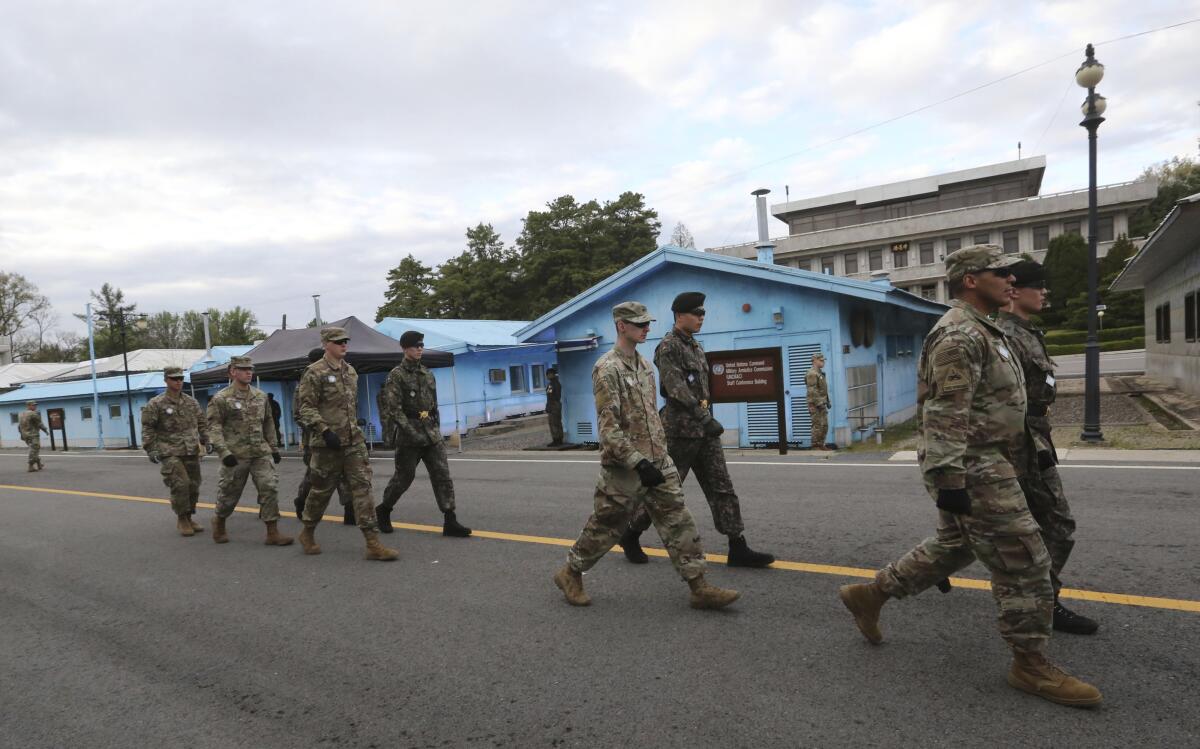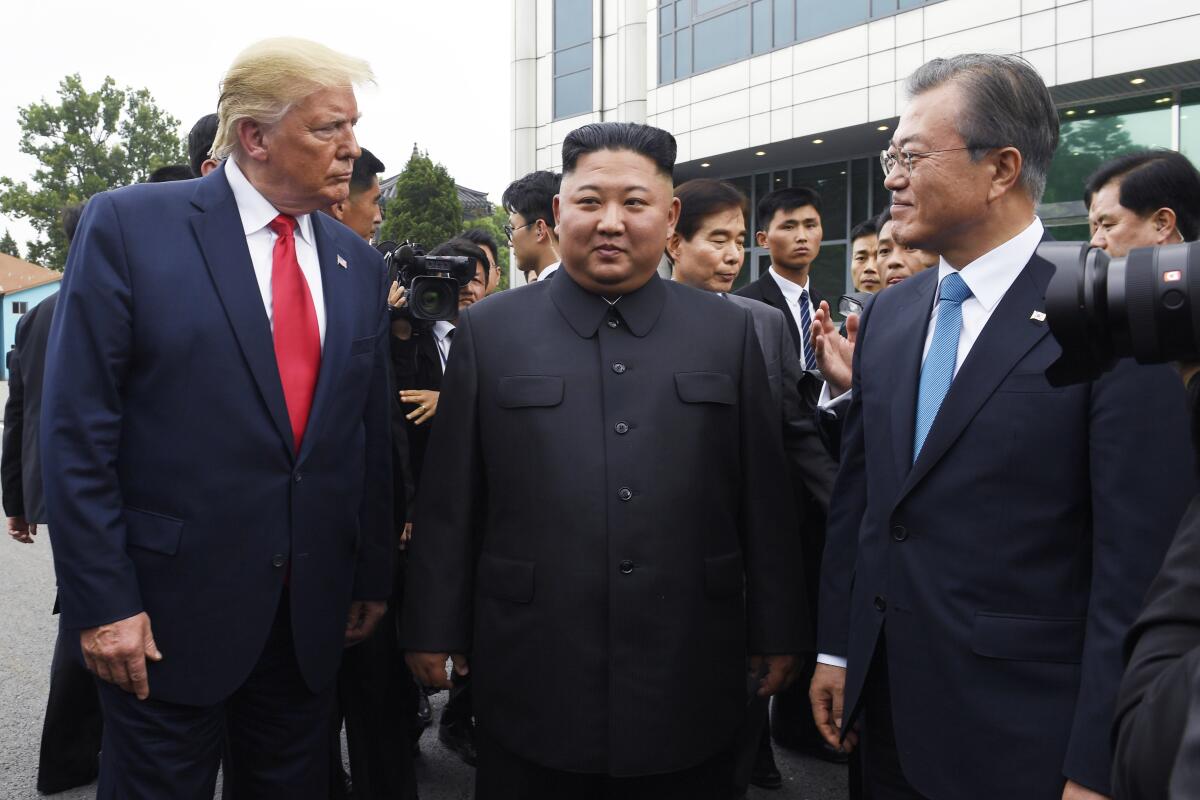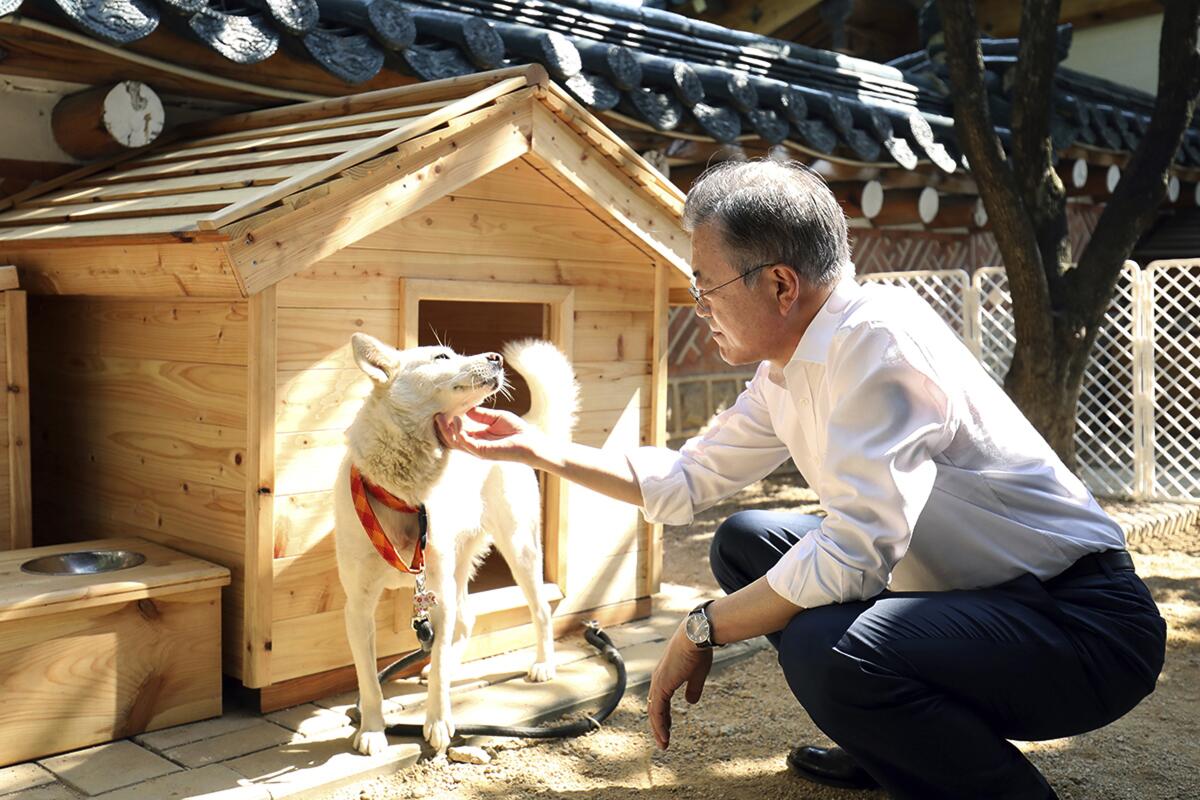Kim Jong Un ‘polite’ and Trump ‘practical’? Former South Korean leader says so in new memoir

- Share via
SEOUL — In the spring of 2018, not long after North Korean dictator Kim Jong Un declared that his country was in the “final stage” of developing an intercontinental ballistic missile capable of striking the United States, then-South Korean President Moon Jae-in set out to play peacemaker.
When the two men met for the first time that April, Moon found Kim softer than his reputation suggested.
“Intelligence or media reports portrayed him as an oppressive dictator and an imperious personality, but the Chairman Kim I met had a completely different demeanor,” Moon writes in a recently released memoir. “He was very polite. He showed a natural respect to his elders.”
In Moon’s account, Kim seemed “sincere” about reaching a nuclear disarmament deal, saying he didn’t want his own daughter to live with nuclear weapons hanging over her head.

The sympathetic portrayal that Moon offers in his bestseller, “From the Periphery to the Center,” a 656-page account of his foreign policy, has set off a political furor here, with Moon’s opponents accusing him of getting played.
“Former President Moon truly is Kim Jong Un’s senior spokesperson,” said Yoon Sang-hyun, a lawmaker with the conservative People Power Party, which won the presidency in 2022, unseating Moon’s Democratic Party.
Though Moon succeeded in bringing Kim and then-President Trump together for three historic summits, those talks sputtered out.
North Korea’s nuclear threat has been kept largely on the back burner by President Biden’s administration, but pressure has been rising.
“When Kim Jong Un said that he had ‘no intentions whatsoever of using nuclear weapons,’ former president Moon completely believed him,” Ahn Cheol-soo, another conservative lawmaker, wrote on social media. “But it’s become clear that North Korea had no intention of giving up their nuclear weapons and was only interested in putting on a smile to get what they wanted.”
Choi Jong-geon, who served as Moon’s deputy foreign minister and plays a key role in the book, dismissed these criticisms as cheap political attacks.
Defending Moon’s good-faith engagement with Kim as a form of “pragmatic and goal-oriented” diplomacy in an interview with local media, Choi pointed to instances in which Moon offered due criticism of Kim and his government.
Moon describes Kim’s return to a hostile posture as a betrayal of the Korean people and condemns North Korea’s dramatic demolition of a building the two governments once shared in a joint industrial zone as the behavior of a “thug nation.”
Kim isn’t the only controversial world leader who gets a favorable second look in the memoir, with Moon looking back on the surprisingly friendly relationship he had with Trump.
“Despite some judgments of him as crude and impolite, I liked that he was candid,” Moon writes.
Even during disagreements over issues like trade or defense cost-sharing, he recalls, “there were never any hurt feelings.”
South Korea’s president has made combating disinformation a centerpiece of his agenda. But free press advocates say his vow to keep reporters honest is a pretext to intimidate his critics
Moon’s account speaks to the unique marriage of convenience that Trump represented for South Korean liberals who favor engagement with North Korea.
Trump is remembered by many here as a refreshing antidote to the hard-line policy that has become the default in Washington.
Moon viewed traditional Republicans as too fixated on regime change. In contrast, he wrote: “President Trump wasn’t ideological at all. His thinking was practical: if the conditions were right, talks could be had and a deal might be reached.”

In order to convince Trump to meet with Kim, Moon played on the U.S. president’s ego during a private moment at a U.S.-South Korea summit in 2017, telling him that “if he were to bring about peaceful denuclearization, it would be an accomplishment that no president — including President Obama — had managed, and that he would certainly be awarded the Nobel Peace Prize.”
Moon blamed the eventual breakdown of the talks on Trump’s aides, including former National Security Advisor John Bolton, who once called for a preemptive military strike against North Korea.
One major stumbling block, according to Moon, was the insistence of Bolton that North Korea follow the “Libyan model” of nuclear disarmament, which did little to help keep Libyan leader Moammar Qaddafi in power after he struck a deal with the United States to dismantle his nuclear weapons program in 2003.
After civil war broke out in Libya in 2011, Qaddafi was captured and killed by rebel forces in a military operation that involved NATO forces.
To avoid such a fate, North Korea has called for a peace treaty with the United States as a condition for giving up its nuclear arsenal.

Moon believed that a formal declaration to end the Korean War, which was only paused with an armistice agreement in 1953, might be a starting point. But he writes that advisors like Bolton, who opposed the possibility on the grounds it would weaken U.S. military presence in the region, “continuously got in the way.”
Today, even as North Korea is believed to be gearing up for its seventh nuclear test, many South Korean liberals still hold the summits as a hopeful model for future denuclearization talks, according to Park Myung-lim, a historian at Yonsei University in Seoul.
“In the past, relations between South Korea and North Korea and those between the U.S. and North Korea tended to follow separate tracks, the former usually confined to economic or humanitarian cooperation and the latter concerned with denuclearization and military matters,” Park said.
“The greatest significance of the memoir is how it shows how the three countries might work through their differences and toward the common goal of denuclearizing and establishing peace on the Korean peninsula.”
More to Read
Sign up for Essential California
The most important California stories and recommendations in your inbox every morning.
You may occasionally receive promotional content from the Los Angeles Times.













